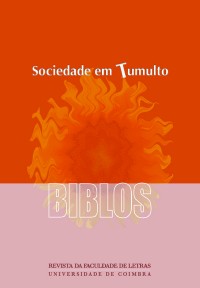Please use this identifier to cite or link to this item:
https://hdl.handle.net/10316.2/32771| DC Field | Value | Language |
|---|---|---|
| dc.contributor.author | Ferreira, Tânia Santos | - |
| dc.date.accessioned | 2014-07-07T16:48:25Z | |
| dc.date.accessioned | 2020-10-08T14:29:23Z | - |
| dc.date.available | 2014-07-07T16:48:25Z | |
| dc.date.available | 2020-10-08T14:29:23Z | - |
| dc.date.issued | 2009 | - |
| dc.identifier.issn | 0870-4112 | - |
| dc.identifier.uri | https://hdl.handle.net/10316.2/32771 | - |
| dc.description.abstract | Este estudo centra-se em dois motivos que o Íon platónico reúne na sua famosa imagem coribântica do “entusiasmo” poético (533d-534b): o mel e as abelhas, que o Hino homérico a Hermes associa à adivinhação; e as Musas, as divindades tradicionais da inspiração poética - não obstante as diferenças marcantes entre a inspiração poética em Homero e em Platão. A posição irónica de Sócrates não significa uma total recusa do “entusiasmo” poético e, no Fedro, Platão alargá-lo-á a Pã e às ninfas (ninfolepsia). | por |
| dc.description.abstract | This paper focuses on two motifs that Plato’s Ion put together in its famous corybantic image of poetical enthousiasmus (533d-534b): honey and bees, which the Homeric Hymn to Hermes relates to divination; and the Muses, the traditional goddesses of poetry (nothwithstanding the remarkable differences between poetical inspiration in Homer and Plato). Socrates’s ironic position doesn’t signify a total rejection of enthousiasmus in Ion; and in Phaedrus Plato extended it to Pan and nymphs (nympholepsy). | eng |
| dc.language.iso | por | - |
| dc.publisher | Faculdade de Letras da Universidade de Coimbra | - |
| dc.subject | inspiration | eng |
| dc.subject | honey | eng |
| dc.subject | bees | eng |
| dc.subject | Muses | eng |
| dc.subject | nympholepsy | eng |
| dc.subject | inspiração | por |
| dc.subject | mel | por |
| dc.subject | abelhas | por |
| dc.subject | Musas | por |
| dc.subject | ninfolepsia | por |
| dc.title | Mel, musas e inspiração poética: o Íon platónico | por |
| dc.type | article | - |
| uc.publication.collection | Biblos vol. VII | - |
| uc.publication.firstPage | 507 | - |
| uc.publication.lastPage | 520 | - |
| uc.publication.location | Coimbra | - |
| uc.publication.journalTitle | Biblos | - |
| uc.publication.volume | 7 | por |
| dc.identifier.doi | 10.14195/0870-4112_7_23 | - |
| uc.publication.section | Textos de estudantes | - |
| uc.publication.orderno | 23 | - |
| uc.publication.area | Artes e Humanidades | - |
| uc.publication.manifest | https://dl.uc.pt/json/iiif/10316.2/32771/280190/manifest?manifest=/json/iiif/10316.2/32771/280190/manifest | - |
| uc.publication.thumbnail | https://dl.uc.pt/retrieve/12389146 | - |
| item.grantfulltext | open | - |
| item.fulltext | With Fulltext | - |
| Appears in Collections: | Biblos | |
Files in This Item:
| File | Description | Size | Format | |
|---|---|---|---|---|
| biblosvii_artigo23.pdf | 631.38 kB | Adobe PDF |  |
Items in DSpace are protected by copyright, with all rights reserved, unless otherwise indicated.
